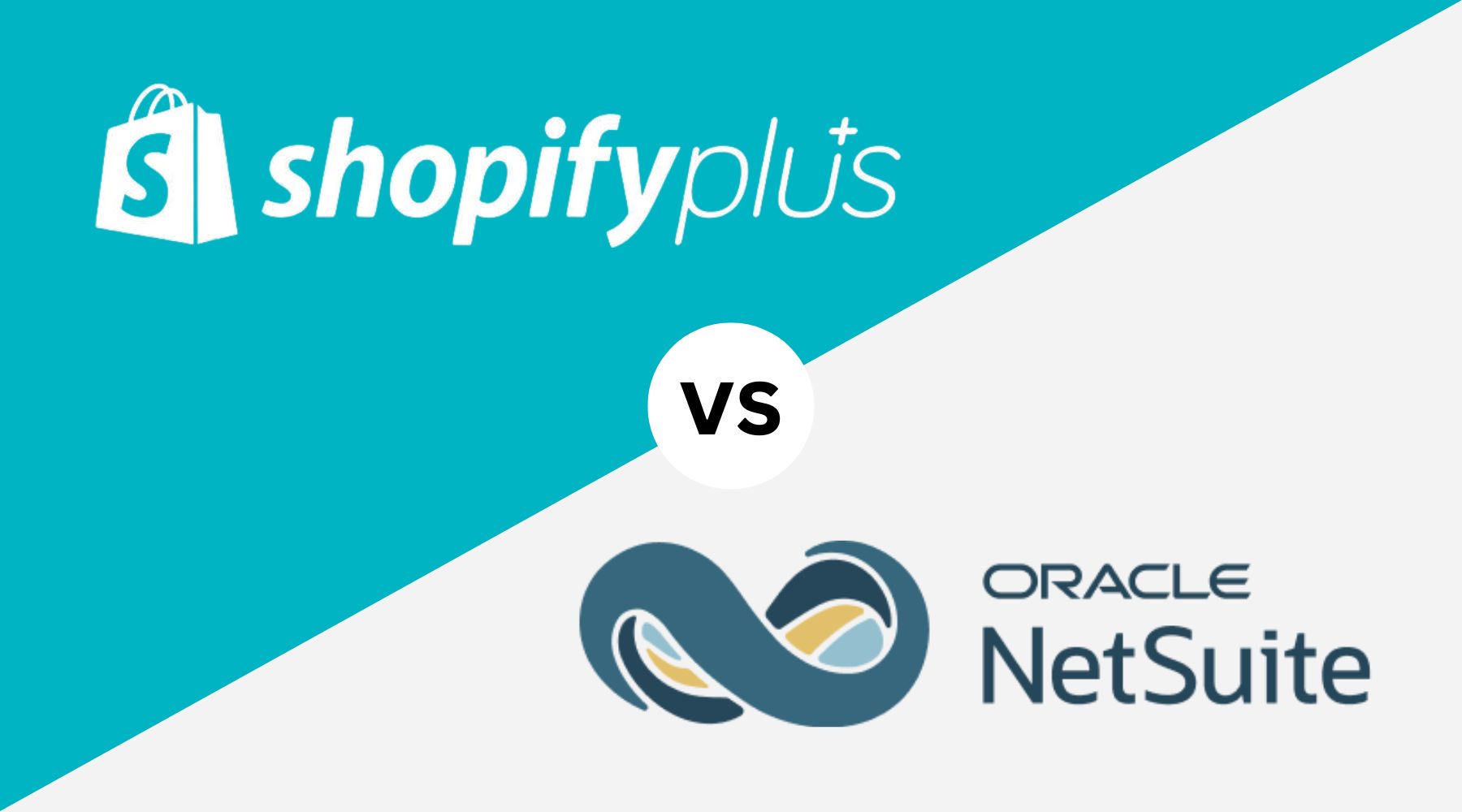Choosing the right enterprise platform can make or break your eCommerce growth. With so many tools on the market, two names often stand out: Shopify Plus vs NetSuite. Both cater to ambitious businesses, but in entirely different ways. One focuses on creating smooth customer experiences, while the other offers a robust backend infrastructure with deep operational control.
This comparison is designed for decision-makers who need clarity, not buzzwords. Whether you're a fast-scaling DTC brand or a B2B company rethinking your tech stack, this guide helps you weigh the real-world pros and cons.
If you're already considering a switch or planning a major upgrade, it's worth exploring how Shopify Plus development services can be tailored to complex business needs.
Let's look at what each platform brings to the table and what that means for your business.
What Is Shopify Plus and NetSuite?
Before comparing performance, pricing, or scalability, it’s essential to understand what each platform actually is.
Shopify Plus is an enterprise-level eCommerce solution built for DTC brands that want to grow fast, without losing flexibility. It's part of the broader Shopify ecosystem, but tailored for high-volume businesses that need advanced features, automation, and priority support.
NetSuite, on the other hand, is an ERP-first platform developed by Oracle. It integrates finance, inventory, CRM, and other core operations into a single system, while also offering eCommerce functionality through SuiteCommerce Advanced. It's a natural fit for companies seeking full control over backend processes, not just front-end sales.
If you're leaning toward a storefront-centric solution that prioritizes performance and user experience, a Shopify Plus agency can help you unlock the platform’s full potential.

Here’s a side-by-side look at both platforms:
|
Feature |
Shopify Plus |
NetSuite SuiteCommerce Advanced |
|
Core Focus |
eCommerce (DTC & some B2B) |
ERP with integrated eCommerce |
|
Ideal Use Case |
Scalable storefronts with fast setup |
Complex, process-heavy businesses needing full control |
|
Customization |
Theme + checkout via Liquid, APIs |
Deep backend & frontend via SuiteScript, SuiteBuilder |
|
Third-Party Integrations |
Extensive app ecosystem, APIs |
Native ERP integrations, REST APIs |
|
Inventory & Order Management |
Requires external tools or apps |
Fully integrated, real-time across channels |
|
Multi-Channel Selling |
Native support for social, marketplaces |
Customizable, more manual setup |
|
Setup Time |
Faster (weeks) |
Longer (months) |
|
Pricing Model |
Based on revenue, starts ~$2,000/month |
Custom quote; typically higher TCO |
|
Best for |
High-growth DTC brands, agencies, eCom startups |
Mid-size to large companies with ERP needs |
Both platforms offer enterprise-grade capabilities, but through very different lenses. The better fit depends on whether your priority is selling more or managing more.
Feature-by-Feature Breakdown: Shopify Plus vs NetSuite
Choosing between these systems means evaluating their strengths where it matters most: performance, flexibility, and functionality. Here's a closer look at key features and where each platform truly shines.
1. Customization & Development
- Shopify Plus is known for its theme-based flexibility and Liquid templating engine. Developers can customize the storefront experience, build private apps, and use headless setups via Hydrogen and Storefront API.
- NetSuite SuiteCommerce Advanced, by contrast, offers deeper backend control. Developers can access and customize ERP-linked workflows, backend logic, and SuiteScript-based automations. While storefront design is more rigid, the operational depth is unmatched.
Verdict: Shopify Plus is ideal for front-end and customer experience customization. NetSuite wins if backend logic, business rules, or ERP integration is your top priority.
2. Order & Inventory Management
- Shopify Plus integrates with third-party systems but relies on external apps for advanced inventory or order logic. Features like Shopify Flow and Shopify Functions offer automation potential but are limited to Plus features.
- NetSuite comes with robust built-in inventory and order management, including warehouse automation, multi-location fulfillment, and real-time stock visibility. No add-ons required.
Verdict: NetSuite dominates for businesses with complex supply chains or B2B operations.

3. Multichannel & International Sales
- Shopify Plus supports selling across multiple channels (Shopify POS, Instagram, TikTok, Amazon). Multi-language and multi-currency are supported natively, and you can manage multiple storefronts from one admin using Markets.
- NetSuite offers strong multi-currency and localization features, but ecommerce-specific multichannel tools may require additional implementation or partner tools.
Verdict: Shopify Plus leads in DTC-focused multichannel commerce; NetSuite requires heavier setup for similar reach.
4. Automation & Workflows
- Shopify Plus offers Shopify Flow for visual workflow automation and Launchpad for campaign scheduling. These tools are user-friendly but limited to predefined triggers/actions.
- NetSuite features SuiteFlow for robust automation, including approval chains, custom record updates, and conditional logic. It's better suited for enterprises needing granular control.
Verdict: NetSuite offers deeper automation, especially across departments. Shopify Plus is easier to use, but less powerful.
5. Reporting & Analytics
- Shopify Plus provides basic analytics and Google Analytics integration. For advanced needs, ShopifyQL Notebooks and third-party apps are often used.
- NetSuite includes native reporting tools tied to ERP data. Users can build custom reports, dashboards, and KPI visualizations across financial and operational data.
Verdict: NetSuite outperforms on comprehensive, business-wide analytics.
6. Customer Support & Implementation
- Shopify Plus offers 24/7 priority support and a dedicated launch engineer. Most implementations are handled by agencies or certified partners.
- NetSuite implementations are complex and often require months of professional setup by solution providers. Ongoing support is typically included in service packages.
Verdict: Shopify Plus wins for fast time-to-launch. NetSuite demands more time, but offers deeper enterprise alignment.
Need expert help navigating your Shopify Plus setup or considering migration? Our Shopify Plus Consulting team is ready to support your next growth phase.

Key Differences: Shopify Plus vs NetSuite
While both platforms promise enterprise-ready solutions, their priorities, architectures, and user experiences vary significantly.
Below, we break down how the two platforms stack up in the areas that matter most:
- scalability,
- flexibility,
- integrations,
- pricing, and
- the ability to serve both B2C and B2B business models.
Use this deep dive to figure out which platform truly fits your goals, your tech stack, and your future growth.
1. Scalability & Performance at Enterprise Level
When it comes to scaling, both Shopify Plus and NetSuite position themselves as enterprise-ready solutions, but their approaches couldn’t be more different.
Shopify Plus was built with fast-growing DTC brands in mind. Its cloud infrastructure automatically scales with demand, ensuring consistent uptime even during traffic spikes. Brands operating flash sales or expanding internationally benefit from localized storefronts, global CDN support, and built-in multi-currency handling. Shopify’s ecosystem is optimized for speed, mobile responsiveness, and seamless integrations, helping teams stay lean while scaling fast.
NetSuite, on the other hand, takes a backend-first approach. With its ERP at the core, SuiteCommerce Advanced is tightly integrated with operational systems. This means scalability is deeply tied to how well your business processes are aligned. Global expansion is possible, but often requires technical teams to implement and manage complex workflows. Uptime and infrastructure reliability are high, but the speed of iteration typically lags behind more agile platforms like Shopify Plus.
If your growth strategy depends on agility, rapid storefront deployment, and sales-driven performance, Shopify Plus is often the preferred route. For infrastructure-focused companies with heavy back-office demands, NetSuite offers the stability and data control required at scale.
→ Want to build a fast, scalable storefront that grows with your business? Explore our Shopify Plus Development Services.
2. Customization, Flexibility & Headless Capabilities
When it comes to customizing your online store and adapting to your existing tech stack, Shopify Plus and NetSuite take very different approaches.
Shopify Plus is built for agility. With access to Shopify’s APIs and the ability to use custom apps, developers can craft unique checkout flows, product logic, and customer experiences. For brands looking to go headless, Shopify Plus supports a modern, decoupled architecture that lets you pair it with frontend frameworks like Next.js or Hydrogen. This gives your development team more creative freedom and frontend speed, without sacrificing Shopify's backend stability.
NetSuite SuiteCommerce, in contrast, is deeply rooted in its ERP backbone. That can be powerful if your business is already fully committed to NetSuite’s ecosystem. You get deep control over back-office logic, but customizing the frontend or integrating modern headless tools often requires heavy lifting and experienced NetSuite developers. Flexibility is possible, but rarely quick.
If your priority is adaptability, speed of development, and a modern API-first environment, Shopify Plus gives you the technical freedom to build and scale fast.

3. System Integration: ERP, CRM & Marketing Stack
System integration is often the tipping point when choosing an enterprise platform, especially for businesses that rely on a complex tech stack.
NetSuite shines in this category with its all-in-one ERP approach. Finance, inventory, CRM, and eCommerce all live under one roof. This native connectivity is a huge advantage for companies that want real-time data consistency across departments without relying on external apps. However, this comes at a price: the implementation is often rigid, and custom integrations can be time-consuming and resource-heavy.
Shopify Plus, on the other hand, embraces the modular approach. While it doesn’t come with an ERP or CRM out of the box, it integrates seamlessly with almost any tool you already use, be it HubSpot, Klaviyo, Salesforce, or your preferred inventory system. The App Store and API access make it easy to connect tools across your marketing and operations stack, without compromising performance or flexibility.
In short: NetSuite gives you a deeply unified suite, but with limitations in agility. Shopify Plus gives you best-in-class integrations across your favorite platforms, empowering you to build your own ecosystem.
→ Curious how Shopify Plus fits into your current setup? Explore our Shopify Plus consulting services
4. Checkout Experience, UX & Conversion Focus
When it comes to converting visitors into buyers, the checkout experience is critical.
Shopify Plus puts conversion at the heart of its platform. You get access to the customizable checkout.liquid file, allowing you to adapt every step of the checkout process to your brand, product type, or audience. Add upsells, tweak the UI, test variations, Shopify Plus was made for high-performing funnels and optimization at scale.
NetSuite, with its SuiteCommerce Advanced module, offers less flexibility out of the box. While it supports basic customization, adapting the checkout to nuanced conversion goals often requires developer-heavy work or external plugins. The focus is more on operational stability than rapid testing or CRO features.
In short: If your business depends on a seamless, optimized checkout with frequent testing and branding control, Shopify Plus is the better fit.
5. B2B vs B2C: Which Platform Does Both Better?
Enterprise brands rarely fit into a single mold. Whether you're running a DTC powerhouse or expanding into B2B, your platform needs to keep pace.
NetSuite was built with B2B complexity in mind. It supports customer-specific pricing, negotiated contracts, order approvals, and tiered accounts. These features are baked into the core ERP, making it ideal for manufacturers, wholesalers, or distributors with multi-step sales processes.
Shopify Plus excels in the B2C space, with native tools for managing product drops, flash sales, influencer campaigns, and more. That said, the new B2B on Shopify suite brings custom catalogs, payment terms, and company profiles to the table, making Shopify increasingly relevant for hybrid businesses.
→ For a deeper dive into B2B vs DTC capabilities, check out our article on Shopify Advanced vs Shopify Plus.

6. Pricing Models: What Do Shopify Plus and NetSuite Really Cost?
Let’s talk numbers, because enterprise decisions always lead back to ROI.
Shopify Plus pricing starts at around $2,000 per month and includes unlimited staff accounts, checkout customization, and access to exclusive apps. It’s a subscription-based model, with additional transaction fees (unless you use Shopify Payments). Costs are predictable and scale reasonably with business size.
NetSuite operates on a licensing model with multiple add-ons. You’ll pay for base ERP access, ecommerce modules, user licenses, and support. That flexibility can become expensive, especially for small teams or rapidly scaling businesses. Implementation and maintenance also tend to be more costly upfront.
NetSuite licenses vary by edition and user type. Most advanced NetSuite modules typically range from $499 to $899 per month, although there are some exceptions. Entry tiers start at around $2,500/month (Starter edition for small businesses) and go up to $5,000+/month for enterprise editions. These are the prices we were able to research. For an exact price, the provider must be contacted.
All information is without guarantee.
While Shopify Plus offers transparency and low entry costs, NetSuite can justify its price through operational depth, if your team can make full use of the platform.
Choosing between Shopify Plus vs NetSuite isn’t just a tech decision, it’s a strategic one. Each platform serves a very different purpose and fits a different business mindset.
Shopify Plus is the better fit for high-growth DTC brands and agile teams that want to move fast, test ideas quickly, and scale without heavy technical overhead. Its pricing is transparent, the ecosystem is massive, and customization is possible, even in headless setups, without needing a fleet of developers. If you want a powerful storefront with a strong conversion focus and fewer headaches, Shopify Plus gets you there.
NetSuite, on the other hand, is built for operational complexity. If your business model relies heavily on ERP-level integrations, custom workflows, or detailed financial reporting across global entities, NetSuite SuiteCommerce Advanced may be worth the higher cost and effort. It’s especially attractive for companies with mature internal teams that can manage (and fully utilize) its depth.
When to upgrade or switch?
- Move to Shopify Plus if you’re on Shopify Advanced and need checkout customization, international storefronts, or higher volume capacity.
- Consider NetSuite if you're already deep in the Oracle ecosystem or need tighter integration between ecommerce, finance, and operations, and you have the team to manage it.
Still deciding? Check out our comparison: Shopify Plus vs Magento to explore how Shopify performs against another major enterprise player.








